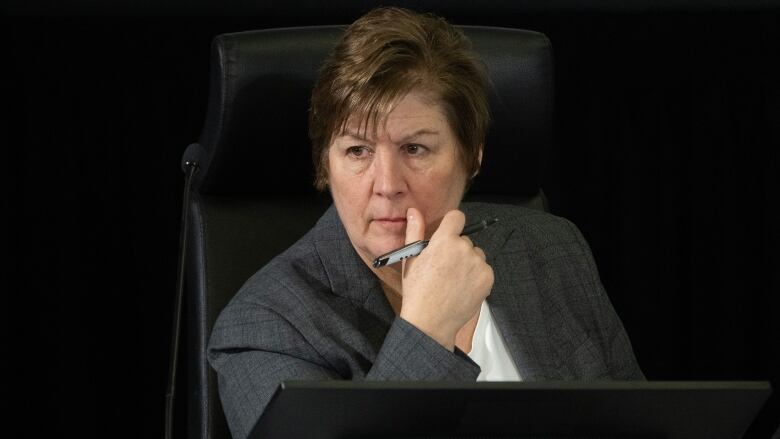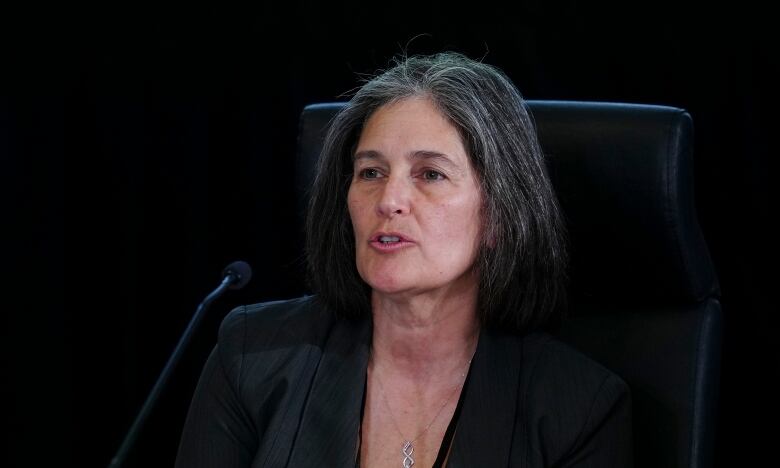Failure to communicate: What Week 2 of the foreign interference inquiry revealed
Testimony, documents suggest efforts to safeguard elections plagued by information bottlenecks

Commissioner Marie-Jose Hogue's mandate for the foreign interference inquiry is sprawling but one of her key tasks is to examine and assess the flow of information related to alleged meddling in the previous two federalelections.
Testimony and documents published during Week 2of the inquiry's public hearings suggestCanada's approach to safeguarding those elections was plaguedby failures to communicate important information.
From a top bureaucrat tasked with safeguarding the integrity of those elections, frompolitical parties and from candidates whoallegedly were targeted,a common question emerged: Why were we not informed?
Parties kept in the dark
The inquiry, led by Quebec judge Marie-Josee Hogue, expects to hear testimony from more than 40 people, including community members, political party representatives and federal election officials.
Former Conservative leader Erin O'Toole, who led the party during the 2021 federal election, received a classified briefing onforeign interference activities by the Canadian Security Intelligence Service (CSIS) in May of 2023.
When he was asked by seniorcounsel for the Foreign Interference Commission during a public hearing of the foreign interference inquiry earlier this week if he found that briefinguseful, O'Toolesaid he would have appreciated getting the briefing "a few years earlier."
O'Toole said the Security and Intelligence Threats to Elections Task Force (SITE) the federal body tasked with safeguarding Canadian elections told a member of his election team at the beginning of the campaign that there were no real problems in the 2019 election campaign and SITE didn't expect any serious problems in the 2021 campaign.
"We were kind of lulled into a sense of complacency, that everything should be fine ... there were no real problems in 2019," he told the inquiry. "We now know that not to be the case."
O'Toole said his election team then started seeing what appeared to beChinese state media-backed disinformation reports targeting his leadership, the party and specific Conservative candidates during the campaign.
O'Toole said his team raised their concerns with SITE but the task force downplayed them and did not disclose to the Conservative team an intelligence assessmentthat appeared to support what the campaign was observing.

Thatintelligence assessment was drafted by theRapid Response Mechanism Canada, a body established in 2018 to identify and respond to foreign threats to democracy. It was dated Sept. 13, 2021, seven days before Canadians cast their ballots.
The top-secret document said RRM had"observed what may be a Chinese Communist Party (CCP) information operation that aims to discourage voters from voting for the Conservative Party of Canada."
A redacted version of the document was published by the inquiry. But O'Toole told the inquiry the assessment was never shared with his campaign.
The assessment added that RRM was unable to determine whether there was coordination between Chinese Communist Party media and WeChat news accountsserving Chinese-speaking Canadians that were amplifying the narrative.
The Liberal, Conservative and NDP 2021 campaign representatives who liaised with SITE all told the inquiry this week that the task force's briefings were generic and didn't provideusefulor actionable information.
Lyall King, who served as chair of SITE during the 2019 and 2021 elections, told the inquiry Friday that the purpose of the task force briefings was to educate the parties and make themaware "in greater detail what foreign interference was, how it was conducted and in what spaces it was being conducted so that they would be able to look in their own campaigns and their own spaces to try and see if they could potentially identify activities of that kind."
When asked about the criticism coming from the party representatives, King told the inquiry that while he understands their frustration,it was "never intended" thatSITE would share specific intelligence with the parties.
He also noted that briefing political parties on classified information was a new endeavour for SITE. "There's learning processes on both sides," he said.
Secrets in silos
According to anotherredacted top secret document published by the inquiry this week, King himself was frustrated with the flow of information from Canada's intelligence agencies to SITE during the 2019 election.
On October 31, 2019 10days after election day King wrote an email to a CSISrepresentative on the SITE task forceexpressing dismay about a CSIS national security briefing that was revealed to the task force after election day. It's not clearwhat the briefing revealed;the email is heavily redacted.
"This document is massively problematic from my perspective. And will raise many questions," King wrote to the CSIS representative, whose name also was redacted.
"SITE had no visibility of this reporting," King wrote. "I have to question why this was not shared in advance with SITE particularly given the severity of the alleged activity."
King said in the email that the limited distribution of the briefing effectively rendered the intelligence useless.
"How can we identify and understand the complete picture and explore ways to mitigate the problem if only five people receive the information and no-one in an operational capacity," King wrote. "Silos do not help."
King went on to describe a specific statement in the top secret document as "massively problematic."
"This will raise so many questions and one week after the election when this information was clearly known beforehand and built up over time. There will be questions as to why this was not brought forth sooner," King wrote.
"The whole purpose of SITE was to review, share, assess and respond to foreign interference. This puts us in a very difficult spot, and brings into question the integrity of SITE."

CSIS assistant director Cherie Henderson was asked at the foreign interference inquiry about King's 2019 email on Thursday. She said it was an issue of timing and the report in question was the culmination of an investigation that began before the 2019 election campaign. SITE only manages issues that arise during the election period.
Henderson said the top-secret report that was was finalized and shared with SITE after the 2019 election included a line that said "the actor has already had an impact on the 2019 federal election and will remain a foreign interference threat after the election."
"When we took a look back at the report and the assessment, we felt internally that that was a bit of a leap too far. The threat actor would have had an impact on that particular time frame, and that particular issue, but that would not have impacted the integrity of the 2019 election. It was just a little bit too strong of an assessment," Henderson told the inquiry.
Henderson said CSISre-wrote that section of the report and resubmitted it.
SITE: An informed public is the 'best' defence
In an interview with CBC News, national security and intelligence expert Wesley Warksaid that sharing secrets with the public goes against the core instincts ofintelligence agencies.
"There's always a challenge for intelligence agencies to kind of dial back their concerns about secrecy and protection of secrets, particularly if they have to reach a public audience whether it's a general Canadian public audience or a public audience in the form ofsecurity-cleared representatives of the political parties," said Wark.
"It's just not in the DNA of the intelligence agencies to do that. So they have to get over that."
SITE itself acknowledged after the 2019 election the level of communication with the public on foreign interference was insufficient.
"There was an over-reliance on a single set of talking points, agreed to before the election period, which resulted in a lack of nuanced messaging that actually addressed the media's questions or allowed SITE-TF to tell its story," says a post-2019 election SITE document published by the inquiry.
"A more nuanced approach to public messaging, and a greater willingness to share more information, will help the public better understand both the relevant threats and the government's response to those threats.
"An informed public is the best line of defence against foreigninterference."












_(720p).jpg)


 OFFICIAL HD MUSIC VIDEO.jpg)
.jpg)



























































































